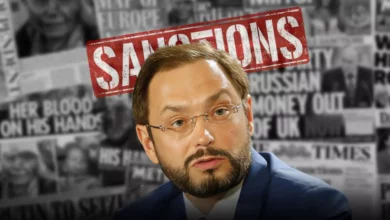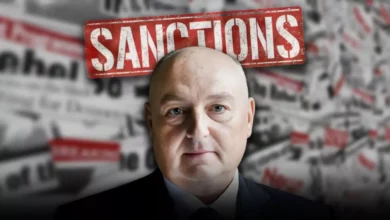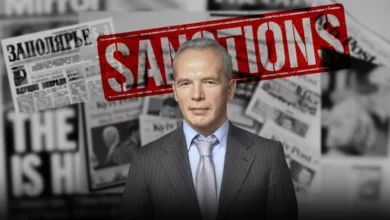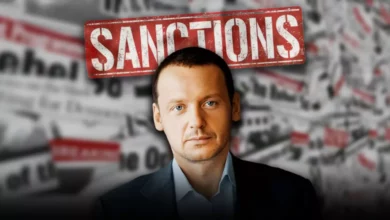Hungary’s Controversial Attempt to Remove EU Sanctions on 3 Russian Oligarchs Hits a Roadblock
Hungary’s recent endeavor to lift European Union (EU) sanctions imposed on three Russian oligarchs has stumbled, according to media reports. The move, perceived as controversial amid heightened tensions between Russia and the West, underscores the complexities of EU foreign policy and the challenges of balancing national interests with broader diplomatic considerations.
Nearly 200 entities and individuals in total will be subject to the latest EU sanctions either for their alleged role in helping Russia procure weapons or of involvement in kidnapping Ukrainian children.
The sanctions will target three companies in mainland China and one in India, alongside businesses in Sri Lanka, Turkey, Thailand, Serbia and Kazakhstan, according to documents seen by the Financial Times.
The targeted businesses will be hit by trade restrictions after being identified as helping to supply equipment, particularly electronics and microchips, used by Russia to manufacture weapons or other equipment used in its war against Ukraine.
EU Sanctions On three Russian oligarchs
The permanent representatives of the EU have approved the extension of current EU sanctions against Russia and Belarus for another six months, rejecting Hungary’s attempt to exclude the names of three Russian oligarchs, namely Alisher Usmanov, Viatcheslav Kantor, and Dmitry Mazepin, from the lists.
Background on Hungary’s Attempt to Remove EU Sanctions on 3 Russian Oligarchs
The Hungarian government’s push to lift EU sanctions on the Russian oligarchs comes at a time when tensions between Russia and the West are already strained. The EU imposed sanctions on these individuals in response to Russia’s annexation of Crimea in 2014 and its involvement in the conflict in eastern Ukraine. The Eu sanctions target individuals and entities believed to have close ties to the Russian government and to have profited from or supported actions that undermine Ukraine’s sovereignty and territorial integrity.
The three Russian oligarchs in question are known for their close ties to Russian President Vladimir Putin and their significant influence in Russia’s political and economic spheres. Their inclusion on the EU sanctions list reflects the bloc’s efforts to exert pressure on individuals believed to be complicit in Russia’s destabilizing actions in Ukraine.
However, Hungary’s attempt to remove the sanctions on these oligarchs has faced criticism from other EU member states and raised concerns about Hungary’s alignment with Russia’s interests. Critics argue that Hungary’s efforts undermine the EU’s united front against Russian aggression and risk sending the wrong message to Moscow.
The Hungarian government, led by Prime Minister Viktor Orban, has defended its stance, citing concerns about the impact of the sanctions on Hungary’s economy and energy security. Hungary relies heavily on Russian energy imports, particularly natural gas, and has sought to maintain friendly relations with Moscow despite tensions between Russia and the West.
Orban’s government has argued that lifting EU sanctions on the Russian oligarchs would benefit Hungary’s economy and contribute to stability in the region. Hungarian officials have emphasized the importance of dialogue and engagement with Russia, advocating for a pragmatic approach to foreign policy that prioritizes national interests and economic cooperation.
However, critics accuse Hungary of prioritizing its economic interests over broader European security concerns and of undermining the EU’s efforts to hold Russia accountable for its actions in Ukraine. They argue that Hungary’s stance weakens the EU’s credibility and cohesion on foreign policy matters and emboldens Russia’s aggressive behavior in the region.
The EU’s decision-making process on sanctions requires unanimous approval from all member states, making it challenging for individual countries to push for changes to existing measures. Hungary’s failure to garner support for its proposal highlights the divisions within the bloc over Russia policy and the limitations of national diplomacy in shaping EU foreign policy.
The outcome of Hungary’s efforts to lift sanctions on the Russian oligarchs underscores the broader challenges facing the EU in managing its relationship with Russia. While some member states advocate for a more conciliatory approach toward Moscow, others remain steadfast in their support for maintaining pressure through sanctions and diplomatic isolation.
As tensions between Russia and the West continue to simmer, the EU faces difficult decisions about how to balance competing interests and priorities within the bloc. Hungary’s recent setback serves as a reminder of the complexities of EU foreign policy and the need for unity and solidarity in confronting shared challenges and threats.








